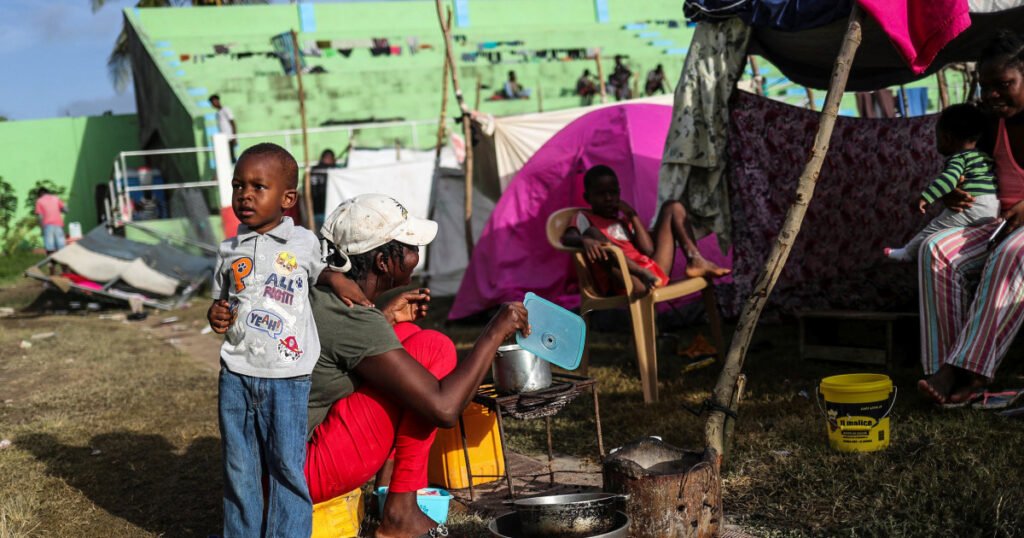Haiti, scarred by Red Cross' 'aid' in 2010, wary of agency's help in latest recovery effort
Organizations in Haiti are on the front lines as the Caribbean country struggles to find its footing after the weekend’s 7.2-magnitude earthquake killed hundreds of people, injured thousands more and leveled homes and buildings. And a tropical depression packing heavy rain and wind is further complicating the earthquake response.
The devastation has revived anger over relief efforts after Haiti’s last massive earthquake, in 2010, which was estimated to have killed 200,000 people. Activists and others have urged the public to donate and provide resources to local organizations and groups directly connected to people in the country rather than give to large, disconnected organizations.
“It’s like we’re living this nightmare, reliving 2010, all over again, just in a different part of the country,” said Katiana Anglade, development and operations director for the Lambi Fund of Haiti, which provides resources to Haitian community groups.
“We all had concerns with the foreign aid that was coming in then. The money wasn’t disseminated in a way so people who actually needed it could get it. Do we know what happened to it? No one does,” Anglade said. “That’s why a lot of people now who want to help are making the necessary efforts to do the research and find grassroots organizations and Haitian-led organizations to donate to, where it will provide immediate relief to people who need it.”
Saturday’s earthquake struck 78 miles west of the capital, Port-au-Prince, according to the U.S. Geological Survey, killing at least 2,189 people and injuring more than 12,000. The disaster struck as the country was still struggling to recover from the massive 2010 earthquake close to Port-au-Prince.
In the months leading up to the earthquake, Haitians were dealing with the Covid-19 pandemic, worsening poverty and the assassination of the president. Anglade said many Haitians were displaced, wandering through the rubble and seeking clean water. Lambi, whose main office is in Port-au-Prince, has been working with community groups to provide clean water and other aid.
The botched aid response after the 2010 earthquake made headlines. An NPR and ProPublica report found that the American Red Cross’ promise to help Haiti rebuild ended up in “poorly managed projects” and millions of dollars missing. The Red Cross said then that it had provided homes for more than 130,000 people, but, according to the report, it built only six permanent homes. Haitians told NPR and ProPublica that they hadn’t seen any results after the Red Cross promised a $13 million development effort in the northern part of the country.
As a result, activists have warned the public against donating to the American Red Cross. In a statement to NBC News, it said that it “strongly disputes” claims that it mismanaged funds after the 2010 disaster and that it is working with the Haitian Red Cross, the global Red Cross and the Red Crescent network to help earthquake victims. Officials noted that the American Red Cross isn’t accepting financial donations for Haiti and highlighted the difficulties of providing aid.
“The American Red Cross is heartbroken that a 7.2 magnitude earthquake struck the southern region of Haiti on Saturday,” the statement began. “Several factors complicate the humanitarian response, including multiple aftershocks having struck the area with at least four being a magnitude of 5.0 or higher. Emergencies of this scale remind us that disaster relief is a team effort. Organizations big and small each have a role to play to ensure gaps are filled.”
The organization provided a breakdown of its 2010 aid spending, which shows it spent about $148.5 million in the first six months after the earthquake to provide food, water, medical care and emergency shelter. The breakdown also shows that millions of dollars were put toward shelter projects and food distribution.
Lambi is one of many groups that sprang into action to provide medical care, food, clothing and other resources, including Fonkoze, HaitiOne, the Haiti Emergency Relief Fund, the What If Foundation and the St. Boniface Haiti Foundation, which operates out of St. Boniface Hospital in Fond-des-Blancs. Most of the groups’ members are Haitian themselves, highlighting the importance of community members’ being heavily involved in rebuilding and repair efforts. Conor Shapiro, president of the St. Boniface Haiti Foundation, said that international aid has been scarce since the tragedy but that communities are banding together to help one another.
“Our team has been responding since the moment the earthquake hit on Saturday morning. We are receiving patients from all of the impacted areas,” Shapiro said, adding that the 525-person all-Haitian staff has seen earthquake victims with crushed limbs, massive blood loss and other injuries.
“We have people arriving constantly. We’ve seen over 30 emergency quake-related cases since Saturday. We anticipate many, many more over the next several days,” he said. “Of course, we also have our normal patient load — around 500 people daily, including births, emergency C-sections and, of course, Covid patients.”
The American Red Cross’ 2010 earthquake response wasn’t the only aid effort to have drawn criticism. An Associated Press report in 2010 found that less than 1 cent of each dollar the U.S. gave for Haiti’s earthquake relief was actually going to the country in the form of cash to the government.
Bill Clinton co-chaired the Interim Haiti Recovery Commission, with the U.S. promising Haiti a new port, an industrial park and a power plant to promote economic development, The Guardian reported in 2019. Plans for the industrial park all but failed; the operation even evicted about 366 families to make room for the project, according to a report from ActionAid, an international non-governmental organization that works to combat poverty. Plans for the port faltered, and the power plant’s progress was slow — it now powers only a limited area, and officials are trying to privatize it, according to the U.S. Agency for International Development.
Meanwhile, grassroots Haitian organizations like Na Rive, which is connected to the What If Foundation, stepped in to immediately give emergency relief in 2010 and today are providing mobile clinics to help earthquake victims.
Haitian residents with HaitiOne, an alliance of hundreds of churches, schools and nonprofit organizations, have built over 1,000 homes since the 2010 earthquake. Since Saturday, the organization has helped transport victims to hospitals, sent out thousands of meals and provided tents, tarps, sleeping bags, wheelchairs, water and medical supplies, HaitiOne President Brad Johnson said. The group is working to help rebuild schools and churches in the area.
“When you look at the problems we had in 2010, a lot of people who raised a lot of money weren’t working in Haiti. They raised money, then had to figure out how to work in Haiti, where the organizations that we’re primarily working with in Haiti are already in Haiti, and they’re going to be in Haiti in 10 years,” Johnson said.
“The funding goes a lot further when you’re letting a Haitian who knows the country and cares about their country spend it,” he said. “We want to hire Haitians, we want to support Haitians to do the work, and if you can do that, you can see the entire economy change for all people, versus so much of the money never getting to Haiti.”
You may be interested

Newly identified chemical in drinking water could be toxic: study
new admin - Nov 21, 2024[ad_1] The SummaryA newly identified chemical byproduct may be present in drinking water in about a third of U.S. homes,…

A new ‘ultra-secure’ phone carrier says it can make you harder to track
new admin - Nov 21, 2024Cape is a mobile virtual network operator (MVNO) that uses UScellular’s network. But since it runs its mobile own core,…

Matt Gaetz withdraws as attorney general nominee, says “Trump’s DOJ must be in place and ready on Day 1”
new admin - Nov 21, 2024Washington — Former Florida Rep. Matt Gaetz announced Thursday that he is withdrawing his nomination for attorney general.President-elect Donald Trump…





































